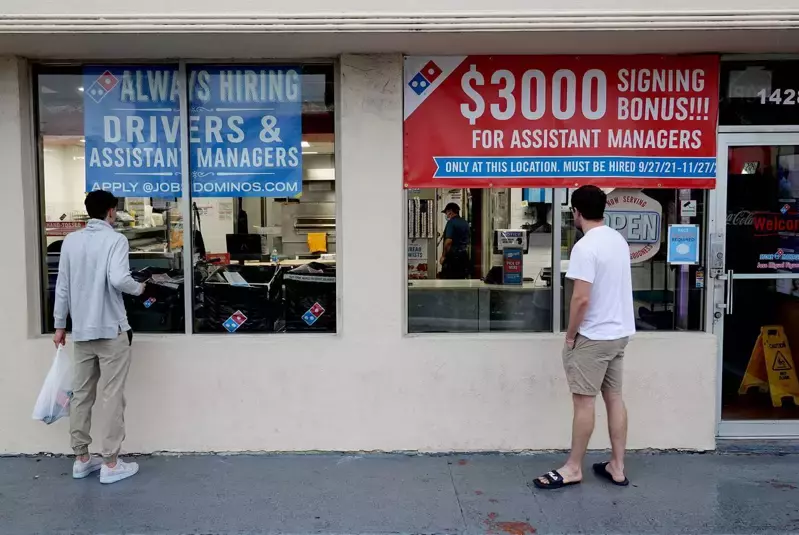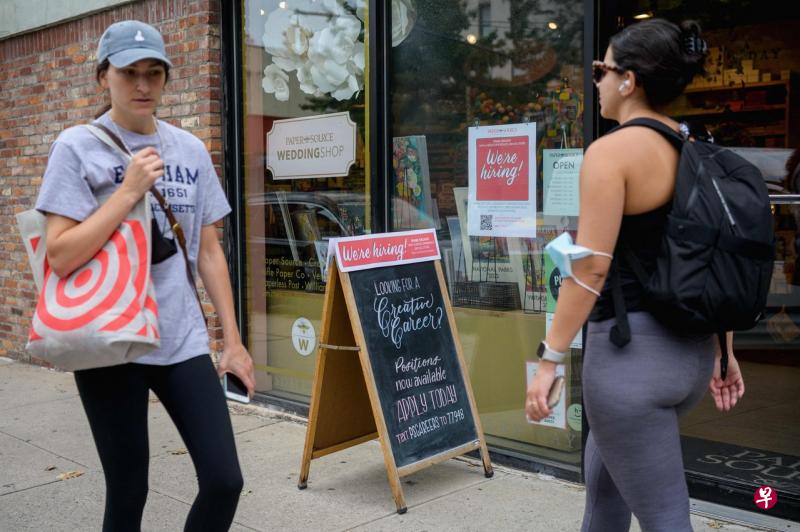
Tel: 551-580-4856 | Email: F.WINNIE.S@GMAIL.COM
想离职?主动辞职无法领失业金 有合理原因才能申请
世界新闻网
11/12/2021

选择离开职场的美国劳工人数,如今创下历史新高,但主动辞职者恐怕因为失去资格,无法领取失业救济金;就业咨询机构「确实征才实验室」(Indeed Hiring Lab)经济研究部主任邦克尔(Nick Bunker)说,这波辞职潮主要集中在需要面对面接触或相对低薪的少数产业。
Sep 30, 2021
劳工维权团体「全国就业法计划」(National Employment Law Project)州政策计划部主任桑恩(Paul Sonn)指出,一般而言,如果劳工主动辞职,便没有资格领取失业救济金。他说,主动辞职的劳工,不能指望待业期间可以靠失业津贴过生活。
桑恩指出,主动辞职的劳工当中,如果具有合理原因,还是可以申请得到失业救济金,例如因为工作环境不安全而离职的劳工,或者在雇主施压之下被迫离开的「推定解聘」(constructive discharge)劳工,都可能被认定拥有领取失业救济金的资格。

然而,身为失业保险(unemployment insurance,UI)计划主管机关的各州政府,对于规定条款的解释则各有不同。
Apr 13, 2020
如果辞职劳工申请失业救济金遭到驳回,但觉得自己的状况应该有机会申请成功,则可提出上诉。桑恩指出,上诉过程通常耗时数月。
对于符合领取失业救济金资格的劳工定义,国会在新冠疫情期间予以放宽。如果劳工为了在家照顾孩子而辞职,可能有机会被认定符合联邦政府发放的暂时津贴。不过,联邦政府的失业津贴计划已于今年劳动节(Labor Day)到期。
劳工辞职之后若能迅速找到新工作,或许就不太需要烦恼能否领到失业救济金。劳工部数据显示,今年9月全美共有1040万个职缺等待填补,是美国史上第三高的纪录,仅次于今年7月的1110万个职缺以及8月间的1060万个职缺。
Getting by in ‘The Great Resignation’: How people who quit or retired are making ends meet
By Karla L. Miller, The Washington Post
10/17/2021

In discussing the surge of workers quitting or retiring during the coronavirus pandemic, one question that I keep hearing, and that I asked last week, is: How are people who abruptly quit or retired from their jobs getting by financially?
Most of the departing workers I heard from had also asked themselves that question, but they had decided that they could more easily give up their paychecks than their well-being.
Some retirees said that although the pandemic nudged them into retirement faster than they expected, it also brought relief from the expenses incurred in pursuing their careers.
“I [no longer] need to buy clothes or shoes for work, fill the gas tank three times a week, pay for parking, etc.,” wrote Sandy Marasco in an email. After being laid off from her pharmaceutical industry job in Cambridge, Mass., early during the pandemic, Marasco used her severance package to pay off her mortgage.
She then lived off her savings and state unemployment benefits through 18 months of unsuccessful job-searching before realizing that her earlier goal of working full-time until age 70 no longer appealed to her. Marasco now gets by on Social Security and a 401(k) retirement plan.
Kathleen Corcoran had concerns about giving up the “golden handcuffs” of a full-time job in the high-cost D.C. metro area when she retired from her communications career. But no full-time salary could allow her to buy what she really wanted: time.
Giving up income is stressful, but “then you realize some of that money is going for things to de-stress you” from work, Corcoran told me in a phone interview. “Once I sat down and looked at the numbers, I realized [retiring] was doable – and what I was getting in return was time to pursue things I really wanted to pursue,” such as seeing friends, writing, reading and volunteering. She now teaches part-time, a job she finds “rewarding in a way that goes beyond a paycheck.”
A former office manager in Laurel, Md., who withheld her name because of tension with her former boss, has no regrets about retiring early, even though it meant getting less in Social Security: “If I had waited until 70, I would have received $300 more per month.” But, she said, she weighed her sanity against that financial loss and “decided to take the leap. I’m so happy that I did.”
Of course, retirement is still a long way off for many people. Some have been reassessing what they want from their jobs versus what they need.
Jason S. of New York City, who asked for partial anonymity out of respect for relatives in government who share his surname, was laid off from one contract position and terminated from the next after he had protested being called into the office for a job he’d been told would be 100 percent remote.
Although his wife works and they have six months of savings, Jason’s being out of work is taking a big bite out of their finances, “so this is not sustainable even in the medium term,” he told me in an email. His job-search priorities are shifting: “Taking a lesser-paying job with health insurance over a no-benefits [contract job] would be a no-brainer for me now.”
And some people have been able to weather income loss thanks to careers that conditioned them to prepare for the worst. Marlen Garcia, of Chicago, told me via email how at age 26 she was denied a $5,000 raise with her promotion at a newspaper because of company pay policy, and how she saw other journalists lose jobs and opportunities “on the whims of bosses.”
Garcia told her husband, “We have to be in a position where I can leave my job one day if that happens to me.” They bought a small house and “ate a lot of bologna” so they could afford to pay extra toward the principal each month. When the mortgage was paid off 16 years later, it allowed Garcia the flexibility to take freelance and part-time work when full-time jobs were unavailable.
One common theme among the people who shared their stories with me: They don’t take their relative fortune for granted.
“I have been very lucky and am thankful for that,” Marasco wrote. “I also do what I can for those less fortunate.” Marasco opted not to collect the federal government’s expanded pandemic unemployment benefits.
Garcia recognizes that luck and the economy were important in shoring up her finances. “I had less than $5,000 in loans when I finished college in 1993. [Graduates today] have tens of thousands of dollars in debt. Rents are crazy. Too many homes are unaffordable. I don’t see how they can do it.”
Even before the pandemic, rising costs of living – rather, costs of surviving – have left most low- and middle-income workers unable to build a sizable savings cushion or anchor themselves with real estate and other investments. For those with student loans, medical debt and dependents, the footing was already treacherous. Enter the pandemic, and the ground is crumbling.
I know for every success story I heard, there are many more invisible struggles – people with no pensions, partners or pandemic relief to help them get by. I can only assume they’re consumed with making ends meet.
Karla L. Miller writes the Watercooler column for The Washington Post, offering weekly advice on workplace dramas and traumas.
近20%美国家庭在疫情期间失去全部积蓄
文 / 林煇智
10/14/2021

(早报讯)美国一项调查发现,近20%的美国家庭在冠病疫情期间失去全部积蓄。
彭博社报道,美国国家公共广播电台、罗伯特·伍德·约翰逊基金会和哈佛大学T.H.陈公共卫生学院对3616名18岁以上的美国成年人进行调查。调查发现,年收入低于5万美元(6.74万新元)的人,花光储蓄的比例跃升至30%。
罗伯特·伍德·约翰逊基金会副总裁约瑟夫说,许多人动用储蓄来支付儿童或医疗保健费用。他说:“当危机来临时,或者任何事情变得不正常时,例如,你的孩子生病了,你正在花掉工资。”
在年收入低于5万美元的家庭中,几乎三分之二的家庭表示难以负担房租、医疗和食物。大约三分之二的受访者表示,在过去几个月中获得了政府的援助。但44%的人表示这些“只起到了一点作用”。
约瑟夫说:“我们一直都觉得复苏会不平衡。”“安全网总是有漏洞,而大流行将这些漏洞撕得更大。”
北美法律公益讲座安排
时间:周二到周五 晚间
5:30-7:00(西部)
8:30-9:30(东部)
重播:第二天
上午9:00(西部时间)
中午12:00(东部时间)
周二: 遗嘱和授权书(Lisa讲)
周三: 数据泄露和个人身份保护&事业机会说明会
周四:北美常见法律问题(讲员Irene )
周五:小企业法律和员工福利(晶旌)
Zoom 6045004698,
密码:请扫码进群
另外:周三6:30(西部时间)美国专场
定期邀请美国律师联合讲座
Zoom 951 9092 9213
密码:请扫码进群

Six Spaces Home Staging

Contact: Hongliang Zhang
Tel: 571-474-8885
Email: zhl19740122@gmail.com
报告:发达国家疫情期间损失的就业岗位仅恢复一半
文 / 林煇智
7/07/2021

(早报讯)经济合作与发展组织(OECD)在一份报告中指出,发达国家在疫情期间损失的就业岗位仅恢复了一半,其中年轻人和低技能劳动者受到的冲击最大。
彭博社报道,经合组织表示,截至2020年底,工业国家有大约2200万个工作岗位消失,而这些国家必须到明年年底才能完全恢复到疫情之前的就业水平。
研究表明,冠病危机加速了过去十年开始的一系列趋势,包括收入不平等加剧、向技术要求更高工作的转变、以及低技能工作者的稳定就业机会减少。
经合组织的就业、劳工和社会事务主管斯卡佩特说:“现在不解决不平等和排斥问题不仅可能导致更深层次的社会分裂,而且会对生产力和经济复苏产生负面影响。”
经合组织发现长期失业“快速累积”,每一波疫情限制措施都使人们重返劳动力市场道路的难度增加。该组织表示,疫情期间全球约有1.14亿个工作岗位流失。
Four-day week ‘an overwhelming success’ in Iceland
BBC
7/06/2021

Reykjavík City Council took part in the trial
Trials of a four-day week in Iceland were an “overwhelming success” and led to many workers moving to shorter hours, researchers have said.
The trials, in which workers were paid the same amount for shorter hours, took place between 2015 and 2019.
Productivity remained the same or improved in the majority of workplaces, researchers said.
A number of other trials are now being run across the world, including in Spain and by Unilever in New Zealand.
In Iceland, the trials run by Reykjavík City Council and the national government eventually included more than 2,500 workers, which amounts to about 1% of Iceland’s working population.
A range of workplaces took part, including preschools, offices, social service providers, and hospitals.
Many of them moved from a 40 hour week to a 35 or 36 hour week, researchers from UK think tank Autonomy and the Association for Sustainable Democracy (Alda) in Iceland said.
The trials led unions to renegotiate working patterns, and now 86% of Iceland’s workforce have either moved to shorter hours for the same pay, or will gain the right to, the researchers said.
Workers reported feeling less stressed and at risk of burnout, and said their health and work-life balance had improved. They also reported having more time to spend with their families, do hobbies and complete household chores.
Will Stronge, director of research at Autonomy, said: “This study shows that the world’s largest ever trial of a shorter working week in the public sector was by all measures an overwhelming success.
“It shows that the public sector is ripe for being a pioneer of shorter working weeks – and lessons can be learned for other governments.”
Gudmundur Haraldsson, a researcher at Alda, said: “The Icelandic shorter working week journey tells us that not only is it possible to work less in modern times, but that progressive change is possible too.”
Spain is piloting a four day working week for companies in part due to the challenges of coronavirus.
And consumer goods giant Unilever is giving staff in New Zealand a chance to cut their hours by 20% without hurting their pay in a trial.
In May, a report commissioned by the 4 Day Week campaign from Platform London suggested that shorter hours could cut the UK’s carbon footprint.
Source: https://www.bbc.com/news/business-57724779
Federal Communications Commission
Emergency Broadband Benefit

The Emergency Broadband Benefit is an FCC program to help families and households struggling to afford internet service during the COVID-19 pandemic. This new benefit will connect eligible households to jobs, critical healthcare services, virtual classrooms, and so much more.
About the Emergency Broadband Benefit
The Emergency Broadband Benefit will provide a discount of up to $50 per month towards broadband service for eligible households and up to $75 per month for households on qualifying Tribal lands. Eligible households can also receive a one-time discount of up to $100 to purchase a laptop, desktop computer, or tablet from participating providers if they contribute more than $10 and less than $50 toward the purchase price.
The Emergency Broadband Benefit is limited to one monthly service discount and one device discount per household.
Who Is Eligible for the Emergency Broadband Benefit Program?
A household is eligible if a member of the household meets one of the criteria below:
- Has an income that is at or below 135% of the Federal Poverty Guidelines or participates in certain assistance programs, such as SNAP, Medicaid, or Lifeline;
- Approved to receive benefits under the free and reduced-price school lunch program or the school breakfast program, including through the USDA Community Eligibility Provision in the 2019-2020 or 2020-2021 school year;
- Received a Federal Pell Grant during the current award year;
- Experienced a substantial loss of income due to job loss or furlough since February 29, 2020 and the household had a total income in 2020 at or below $99,000 for single filers and $198,000 for joint filers; or
- Meets the eligibility criteria for a participating provider’s existing low-income or COVID-19 program.
How to Apply
The online application for the Emergency Broadband Benefit Program is experiencing high demand. We appreciate your patience as we actively work to resolve any connectivity issues users may encounter.
Apply Now
There are three ways for eligible households to apply:
- Contact your preferred participating broadband provider directly to learn about their application process.
- Go to GetEmergencyBroadband.org to apply online and to find participating providers near you.
- Call 833-511-0311 for a mail-in application, and return it along with copies of documents showing proof of eligibility to:
Emergency Broadband Support Center
P.O. Box 7081
London, KY 40742
After receiving an eligibility determination, households can contact their preferred service provider to select an Emergency Broadband Benefit eligible service plan.
Get More Consumer Information
Check out the Broadband Benefit Consumer FAQ for more information about the benefit.
Which Broadband Providers Are Participating in the Emergency Broadband Benefit?
Various broadband providers, including those offering landline and wireless broadband, are participating in the Emergency Broadband Benefit. Find broadband service providers offering the Emergency Broadband Benefit in your state or territory.
Broadband providers can find more information about how to participate here.
Source: https://www.fcc.gov/broadbandbenefit
Evictions During COVID-19: Landlords’ Rights and Options When Tenants Can’t Pay Rent
Tips, resources, and advice for landlords whose tenants aren’t able to pay the rent due to the coronavirus outbreak.
By Ann O’Connell, Attorney
11/01/2020
Many renters are facing financial challenges resulting from coronavirus-related business shut-downs, furloughs, layoffs, and stay-at-home orders. The longer this crisis goes on, the more likely it is that many will not be able to pay their rent. When renters default on rent, landlords suffer, and might not be able to meet their own financial obligations, such as making the mortgage payments on the rental property.
Here are some suggestions about how landlords can mitigate the financial impact of tenant defaults during the COVID-19 outbreak.
Terminations and Evictions
Under normal circumstances, when tenants don’t pay rent, landlords have the option of terminating the tenancy (by serving the tenant with either a pay rent or quit notice or an unconditional quit notice, depending on the applicable laws). When tenants don’t pay the rent or move out by the deadline given in the notice, landlords can then file an eviction lawsuit to have the tenants physically removed from the rental.
However, health and safety concerns due to COVID-19 have led many states, cities, counties, and courts to place moratoriums on evictions. The scope of these temporary bans on evictions varies greatly: some have banned any and all action relating to evictions, while others simply postpone hearings on evictions until the court can arrange a hearing via telephone or video.
If you are a landlord in an area with an eviction moratorium, you might still be able to file eviction papers with the court, but your case might not be heard for a while. However, even if there are no bans in place, evicting tenants who can’t pay the rent due to the coronavirus crisis probably shouldn’t be your first recourse. Aside from optics (you don’t want to get a reputation as the ruthless landlord who booted tenants out of their home in the middle of a stay-at-home order), if you remove tenants right now, you’re going to be faced with having to disinfect the rental, advertise the rental, screen new prospective tenants (of which there might be very few), sign a new lease or rental agreement, and get the new tenants moved in—all while taking measures to abide by emergency guidelines and health and safety measures.
Consider the following options instead.
Evaluate Your Personal Financial Situation
Take a moment to evaluate your own finances. As dire as it sounds, it might be time to take stock of what could happen in a worst-case scenario. Most landlords have likely considered the situation where tenants don’t pay rent, as this can happen at any time. But there’s no denying that this is a different situation—what will happen if your tenants can’t pay for a long time, and your options for finding new (paying) tenants are slim?
Your assessment of how this worst-case scenario will affect your ability to pay your mortgage (if any) and your personal bills will inform how you respond when your tenants can’t pay their rent.
- If your financial situation looks grim: If your ability to pay the mortgage on your rental property hinges on month-to-month rental income, you should take actions to prevent your own default This includes options discussed below, such as contacting your lender and proactively seeking arrangements with tenants that allow them to make at least partial payments.
- If you have a few months’ reserves: If your personal reserves or financial position won’t feel too much of a pinch if tenants aren’t able to pay rent for a while, you still might have to make some compromises to retain good tenants. If you have tenants who have previously been reliable and are simply finding it hard to make ends meet currently, do what you can to take some pressure off them—see the discussion below about working out a temporary solution with tenants.
Try to Work Out a Temporary Solution With Tenants
Depending on how desperately you need to receive income from your rental, you have a few options for working with tenants who aren’t able to pay rent because of COVID-19. Consider the following possible arrangements.
- Forgive rent. If your situation allows for it, you could waive rent for a month, with an agreement to revisit the payment arrangement on a certain date. A landlord in Bakersfield recently did this for his tenants.
- Postpone rent. You could offer to postpone rent payments for a month, with an agreement that it will be repaid. Your repayment arrangement could state that the rent owed could be spread out over time, paid all at once, or paid when (if) a stimulus check
- Reduce rent. If you can, consider dropping the rent temporarily to a level that enables you to meet your obligations but forgoes profit for the time being. For example, if you normally collect $1200 a month, but your mortgage is $900 a month, you could temporarily drop rent to $900 to make sure you at least don’t get in trouble with your lender.
Before deciding to make any of these adjustments, try talking to your tenants. Ask them straight out what they think they can make work. If you’re able to accommodate their suggestions, chances are higher that they will do everything they can to hold up their end of the bargain. Be sure to put any agreements in writing, preferably as an addendum to your current lease or rental agreement that includes all details of the arrangement.
Look for Outside Assistance
Even if you think you can float a month or two without rental income, you still might want to consider taking some measures now to protect your position in the event that the coronavirus crisis lasts longer than your cushion can handle. If you’re already feeling the pinch, take these actions immediately.
Attend to Your Mortgage
At this point in the COVID-19 crisis, most private lenders are willing to work with borrowers to ensure that they don’t lose their homes. Call your lender directly and ask what steps it is taking to assist borrowers who can’t meet their mortgage obligations due to the coronavirus pandemic.
- If your loan is owned by Fannie Mae or Freddie Mac, you might be able to delay making payments for a certain period of time without incurring late fees or getting hit with a credit score penalty.
- Look into your options under the Coronavirus Aid, Relief, and Economic Security Act.
- The Federal Housing Administration (FHA) has put in place a foreclosure moratorium for single family homeowners with FHA-insured mortgages.
- Visit your state’s website to find out if the state is offering assistance to homeowners. For example, New York has announced a delay of mortgage payments for 90 days. Many other states are postponing any foreclosure actions indefinitely. Find your state’s website at State and Government on the Net.

Look Into Property Tax Breaks
Some states and counties are extending the deadline for paying property taxes, or cancelling late fees and interest. Check your county’s tax assessor’s website to see if this is an option where your property is located.
Seek a Loan
Consider seeking a loan from family, friends, or private lenders. The U.S. Small Business Administration might be another source of assistance—its disaster loan assistance web page has a wealth of information. You can also contact your regular bank or credit union and inquire about what assistance it can offer.
Research Options for Your Renters
Some areas are beginning to offer rent vouchers or emergency funds to renters in need. For example, the Pennsylvania Apartment Association is collecting donations for funds to give to renters who can’t pay rent. Currently, renters’ needs are getting a lot more attention in the press than landlords’ needs, and there are already a lot more resources being made available for renters. It’s in your best interest to research these options and bring them to your renters’ attention—do what you can to help your tenants pay you.
Landlords are getting squeezed between tenants and lenders
By ANNE D’INNOCENZIO

NEW YORK (AP) — When it comes to sympathetic figures, landlords aren’t exactly at the top of the list. But they, too, have fallen on hard times, demonstrating how the coronavirus outbreak spares almost no one.
Take Shad Elia, who owns 24 single-family apartment units in the Boston area. He says government stimulus benefits allowed his hard-hit tenants to continue to pay the rent. But now that the aid has expired, with Congress unlikely to pass a new package before Election Day, they are falling behind.
Heading into a New England winter, Elia is worried about such expenses as heat and snowplowing in addition to the regular year-round costs, like fixing appliances and leaky faucets.
Elia wonders how much longer his lenders will cut him slack.
“We still have a mortgage. We still have expenses on these properties,” he said. “But there comes a point where we will exhaust whatever reserves we have. At some point, we will fall behind on our payments. They can’t expect landlords to provide subsidized housing.”
The stakes are particularly high for small landlords, whether they own commercial properties, such as storefronts, or residential properties such as apartments. Many are borrowing money from relatives or dipping into their personal savings to meet their mortgage payments.
The big residential and commercial landlords have more options. For instance, the nation’s biggest mall owner, Simon Property Group, is in talks to buy J.C. Penney, a move that would prevent the department store chain from going under and causing Simon to lose one of its biggest tenants. At the same time, Simon is suing the Gap for $107 million in back rent.
Michael Hamilton, a Los Angeles-based real estate partner at the law firm O’Melveny & Myers, said he expects to see more retail and other commercial landlords going to court to collect back rent as they get squeezed between lenders and tenants.
Residential landlords are also fighting back against a Trump administration eviction moratorium that protects certain tenants through the end of 2020. At least 26 lawsuits have been filed by property owners around the country in places such as Tennessee, Georgia and Ohio, many of them claiming the moratorium unfairly strains landlords’ finances and violates their rights.
Apartment dwellers and other residential tenants in the U.S. owe roughly $25 billion in back rent, and that will reach nearly $70 billion by year’s end, according to an estimate in August by Moody’s Analytics.

An estimated 30 million to 40 million people in the U.S. could be at risk of eviction in the next several months, according to an August report by the Aspen Institute, a nonprofit organization.
Jessica Elizabeth Michelle, 37, a single mother with a 7-month-old baby, represents a growing number of renters who are afraid of being homeless once the moratorium on evictions ends.
The San Francisco resident saw her income of $6,000 a month as an event planner evaporate when COVID-19 hit. Supplemental aid from the federal government and the city helped her pay her monthly rent of $2,400 through September. But all that has dried up, except for the unemployment checks that total less than $2,000 a month.
For her October rent, she handed $1,000 to her landlord. She said her landlord has been supportive but has made it clear he has bills to pay, too.
“I never had an issue of paying rent up until now. I cry all night long. It’s terrifying,” Michelle said. “I don’t know what to do. My career was ripped out from under me. It’s gotten to the point of where it’s like, ‘Am I going to be homeless?’ I have no idea.’”
Some landlords are trying to work with their commercial or residential tenants, giving them a break on the rent or more flexible lease terms. But the crisis is costing them.
Analytics firm Trepp, which tracks a type of real estate loan taken out by owners of commercial properties such as offices, apartments, hotels and shopping centers, found that hotels have a nearly 23% rate of delinquency, or 30 days overdue, on their loans, while the retail industry has a 14.9% delinquency rate as of August.
The apartment rental market has so far navigated the crisis well, with a delinquency rate of 3%, according to Trepp. That’s in part because of the eviction moratorium, along with extra unemployment benefits from Washington that have since expired.
“There are bad actors, but the majority of landlords are struggling and are trying to work with a bad situation,” said Andreanecia M. Morris, executive director of HousingNOLA, a public-private partnership that pushes for more affordable housing in the New Orleans area.
Morris, who works with both landlords and tenants, said that government money wasn’t adequate to help tenants pay their rent, particularly in expensive cities. She is calling for comprehensive rental assistance.
She fears that residential landlords will see their properties foreclosed on next year, and the holdings will be bought by big corporations, which are not as invested in the neighborhoods.
Gary Zaremba, who owns and and manages 350 apartment units spread out over 100 buildings in Dayton, Ohio, said he has been working with struggling tenants — many of them hourly workers in restaurants and stores — and directs them to social service agencies for additional help.
But he is nervous about what’s next, especially with winter approaching and the prospect of restaurants shutting down and putting his tenants out of work. He has a small mortgage on the buildings he owns but still has to pay property taxes and fix things like broken windows or leaky plumbing.
“As a landlord, I have to navigate a global pandemic on my own,” Zaremba said, “and it’s confusing.”







